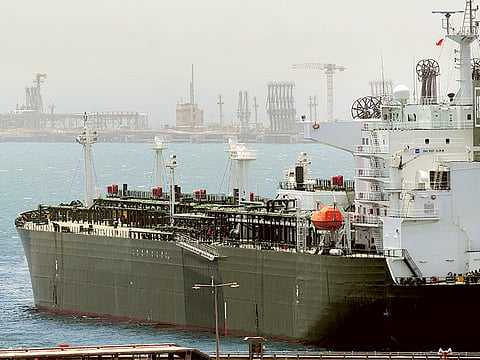GCC to maintain growth with higher oil production
Faced with fiscal strains governments are under pressure to control spending

Dubai: Oil production in the Gulf Cooperation Council (GCC) has been relatively strong in the second quarter of this year with Saudi Arabia and the UAE increasing production and exports. Stronger growth in the hydrocarbons sector should offset slower momentum in the non-oil sectors in Saudi Arabia and the UAE, according to economists at Emirates NBD.
“Higher oil production should help to offset slower growth in the non-oil sectors, which is evident in the Purchasing Managers’ Indices for the two largest economies, Saudi Arabia and the UAE. Higher oil export volumes should also mitigate some of the impact of lower oil prices on GCC budget revenues, albeit only slightly,” said Khatija Haque, Head of Mena Research at Emirates NBD.
Oil production from GCC Opec members such as Saudi Arabia, the UAE, Kuwait and Qatar surged to 16.75 million barrels per day (bpd) in June according to Bloomberg estimates, the highest level on record and against a backdrop of sharply lower oil prices. The rise in GCC output was largely due to Saudi Arabia, where production increased 4.6 per cent quarter on quarter in the second quarter 2015 to reach 10.45 million bpd in June. The UAE increased production by a similar magnitude last quarter, while Kuwait and Qatar saw output decline by 1.4 per cent and 1.5 per cent quarter on quarter, respectively.
Despite higher oil production and exports, the impact of lower oil prices are clearly adding to fiscal pressures in a number of GCC countries, according to economists. “Budgets in the GCC remain under pressure, with net foreign assets in Saudi Arabia and Bahrain declining sharply since the start of the year, and sharply lower oil revenues in Oman and Kuwait in the first quarter of 2015. Rhetoric about reducing state subsidies has increased. Oman and Bahrain remain the most vulnerable in terms of their budgets in the current low oil price environment,” said Haque.
Analysts said larger economies such as Saudi Arabia and the UAE have substantial accumulated reserves to help cushion the impact of lower oil prices, and can maintain relatively expansionary fiscal policies in the near-term, but faced with fiscal strains many of these countries are under pressure to reduce spending.
“Calls to reduce subsidies and raise non-oil revenues have been made by various stakeholders across the GCC in recent months, even in those countries where the fiscal buffers are substantial,” said Jean Paul Pigat, senior economist at Emirates NBD.
As part of fiscal consolidation efforts Kuwait, Oman and Abu Dhabi have reduced some subsidies on fuel and utilities, and the UAE Ministry of Energy is likely to recommend further reductions in fuel subsidies in the UAE going forward. Bahrain has mulled cutting food and other subsides and replacing these with cash handouts to nationals, while Oman has proposed imposing taxes on expatriate remittances and raised natural gas prices in a bid to save money.
Kuwait is expected to record a deficit for the first time in over decade, but again, substantial reserves mean that spending can be maintained.
In Saudi Arabia, official data showed the budget recorded a deficit of -2.3 per cent of GDP in 2014, the first budget deficit in more than a decade.
Analysts expect the budget deficit to widen to just under 12 per cent of GDP this year, on lower oil revenues and relatively high expenditure.
“Oman and Bahrain are expected to run the largest fiscal deficits in the GCC this year, and while we are confident that the budgets can be financed, these countries are facing the most pressure to rationalise spending,” Pigat said.
Sign up for the Daily Briefing
Get the latest news and updates straight to your inbox
